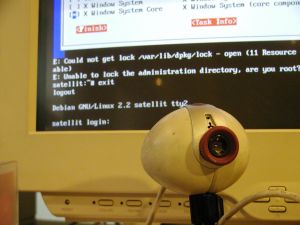 Florida divorce and custody battles can impact the parent-child relationship and often raise concerns for both mother and father. Often, parties are concerned that since they may not see their child on a daily basis that the relationship with their child will lessen over time. While telephone communication is vital to maintaining the relationship with the parent and child, a parent that lives long distance from the child, especially, may miss the face-to-face interaction and want more than simple phone calls. With the invention of webcams and communication availability through things such as Skype, the courts have had to evolve to include such mechanisms. As a Jacksonville, Florida divorce and family lawyer I often ask my clients if they have access to the internet and whether the computer has webcam accessibility because I want to make certain that if video conferencing is available, that we request the court enter an order for electronic communication.
Florida divorce and custody battles can impact the parent-child relationship and often raise concerns for both mother and father. Often, parties are concerned that since they may not see their child on a daily basis that the relationship with their child will lessen over time. While telephone communication is vital to maintaining the relationship with the parent and child, a parent that lives long distance from the child, especially, may miss the face-to-face interaction and want more than simple phone calls. With the invention of webcams and communication availability through things such as Skype, the courts have had to evolve to include such mechanisms. As a Jacksonville, Florida divorce and family lawyer I often ask my clients if they have access to the internet and whether the computer has webcam accessibility because I want to make certain that if video conferencing is available, that we request the court enter an order for electronic communication.
In accordance with Florida statute 61.13003, the Court may look at a number of factors before ruling on the use of electronic communication. Some of the factors include but are not limited to the availability of the equipment to both parties; whether the parties can afford the electronics necessary; the incomes of the parties to determine who should be responsible and how for the costs; whether telephone communication; whether there is a substance abuse issue of a parent; and if it is in the best interest of the child to have such communication.
If the court finds that electronic communication is in the best interest of the child, then the court also may impose safeguards to protect the parent and child from abuse of the electronic communication. There are concerns for safety online, so the Court has the discretion to impose rules on where the communication may occur, what time, etc.
 Jacksonville Divorce Lawyer Blog
Jacksonville Divorce Lawyer Blog


 A recent
A recent  What eHarmony is to dating and marriage, Facebook is becoming for divorce. According to a recent article on Florida divorces, Facebook provides Florida spouses with fertile ground for rekindling old flames and posting all sorts of self-incriminating evidence for the rest of the world to see. It also provides a public soapbox for couples to air their dirty laundry.
What eHarmony is to dating and marriage, Facebook is becoming for divorce. According to a recent article on Florida divorces, Facebook provides Florida spouses with fertile ground for rekindling old flames and posting all sorts of self-incriminating evidence for the rest of the world to see. It also provides a public soapbox for couples to air their dirty laundry.

 Around fourteen million Brits use Facebook and other social networking sites to keep up with old friends or make new ones. A group of British divorce lawyers are claiming that social networking sites like Facebook are tempting people to cheat on their spouses – and the website has been cited in 20% of recent divorce cases. According to the attorneys, people are being caught having inappropriate sexual chats with people who are not their spouse, and in the electronic age it is just too easy for their spouse to catch them at it. Flirty emails and messages have been reported, as well as evidence of actual affairs.
Around fourteen million Brits use Facebook and other social networking sites to keep up with old friends or make new ones. A group of British divorce lawyers are claiming that social networking sites like Facebook are tempting people to cheat on their spouses – and the website has been cited in 20% of recent divorce cases. According to the attorneys, people are being caught having inappropriate sexual chats with people who are not their spouse, and in the electronic age it is just too easy for their spouse to catch them at it. Flirty emails and messages have been reported, as well as evidence of actual affairs.

